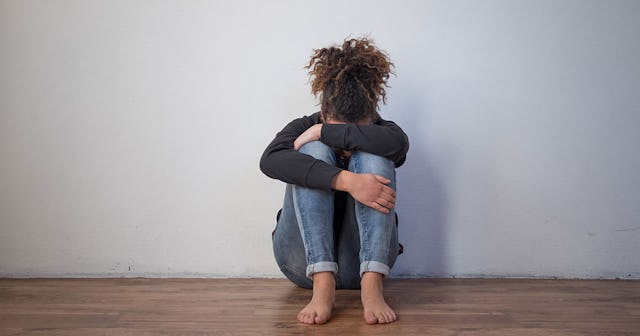When Weight Loss Isn't Healthy

Trigger warning: Eating disorders and body dysmorphic disorder
Compliments. I’ve never been very good about hearing or receiving compliments. And while I don’t know why — the cause of my discomfort is, more likely than not, an issue for my therapist (or the basis for another article) — a recent compliment really threw me for a loop. Four words shook me to my core. Why? Because they were inaccurate and misleading. They simply weren’t true.
So what was the compliment? What were the words which altered the course of my day and, in many ways, my life? A friend, whom I hadn’t seen in months, said “Wow! You look great.” Yes, that’s it. Game. Set. Match. Checkmate.
Now, I know what you’re thinking: How basic. How simplistic and innocuous. How pointedly harmless and innocent. But knowing this individual (really knowing them), I knew what they meant. Physically, I looked good. Since March, I’ve lost weight, and being complimented on my appearance bothered me — a lot — because I’m not healthy.
I’m not well.
You see, my weight loss has been fueled by anger, depression, and grief. My mother died in June, in a sudden and traumatic way. In July, I told my husband I was gay. And, like millions of others, the pandemic has taken a mental toll. I’ve been feeling hopeless and helpless, lost and trapped. But my habits have also changed. Old ways of thinking have returned, and old patterns of eating — or not eating — have (re)appeared.
A long-dormant eating disorder has returned.
I start my day with a cup of iced coffee. Black. I guzzle 20 ounces of water to curb my appetite. To keep the pangs of hunger at bay. I count the hours between meals just as I count calories. Intermittent fasting, it’s called. I don’t eat during certain times of the day. I opt for low or no fat foods, and I measure everything I consume. Ten pretzels. Five strawberries. Three olives. A half cup of yogurt or cottage cheese. And if I eat breakfast, I don’t allow myself the privilege of lunch. I never finish dinner. I also work out constantly. Obsessively.
It’s easy for me to log 50-plus miles a week.
And while I say it’s for my mental health (and, in a sense, it is), it’s also because I’m obsessed with my weight. I struggle with the size of my stomach and backside. I hate the thickness of my thighs. And being thin dictates my life.
I’ve wasted years pursuing “perfection.”
Of course, there is a name for my condition. Body dysmorphic disorder, or BDD, is a mental health disorder characterized by obsessive, self-deprecating thoughts particularly over or about one’s physical appearance.
“Body dysmorphic disorder is a body image, mental health disorder in which someone has persistent negative thoughts about his or her flaws and/or imperfections, whether they are real or perceived, in a way that interferes with their daily lives,” Kathryn Lee — a therapist in New York City — tells Scary Mommy. And that is the case with me.
My day is structured around workouts and food. I’ve missed out on family moments because I’ve been too busy hitting the pavement or lifting weights. Before the pandemic, I would avoid cocktail hours and happy hours. Events which focused around food. And I sleep a lot because I lack the energy to do anything further. I lack the energy to exist. But that’s not all. I read nutrition labels obsessively. I run through pain. Because my thinking isn’t just disordered and distorted, it’s addictive. I’m addicted to feeling. To “power.” To the pursuit of perfection and control.
I’m not alone. Lee tells Scary Mommy addictive behaviors are common amongst those with disordered eating. “You can be addicted to exercise, eating, and/or not eating,” Lee explains. “And since addictions alter pleasure pathways in the brain, such as the levels of serotonin and dopamine, things like exercise, eating, and/or not eating, can fool our bodies to believe that these activities are good for us. However, as with drugs, the addiction occurs when these activities become abused. If an individual is so fixated his or habits that it interferes with his or her daily functioning, a problem may be developing.”
So, what can you do? What should you do? Well, according to Lee, if these issues persist, you can and should get help: “Individuals should reach out to friends, family, and/or a mental health professional to keep them accountable.” And she’s right. Lee’s advice is the advice I need to take because, from the outside looking in, you wouldn’t know I was sick. Hell, no one knows it … not my husband, my best friend, my girlfriends, or my psychologist. I’ve kept my struggles a secret — at least until now. Until earlier this week. But it’s time I get my shit together. I deserve happiness and health.
If you or someone you know is struggling with an eating disorder and/or disordered behaviors, text or call the National Eating Disorder Association’s helpline at 1-800-931-2237.
This article was originally published on